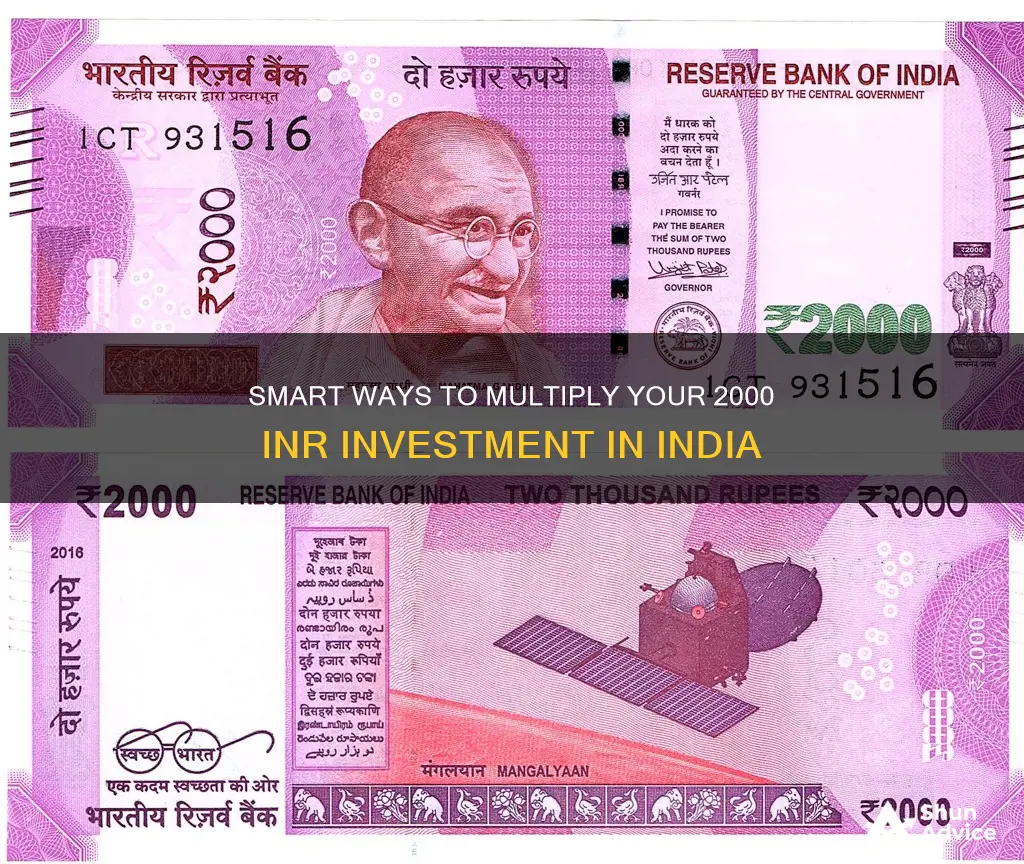
There are many ways to invest 2000 rupees in India, each with its own risk-reward profile. Here are some options:
- Mutual Funds: There are several types of mutual funds available, such as ELSS (Equity Linked Savings Scheme), debt-oriented, equity-oriented, and balanced mutual funds. Mutual funds offer higher returns than other instruments, but there is also a higher risk involved. The rate of return for mutual funds depends on the period of the fund, with long-term funds offering higher average returns.
- Stock Market: Investing in the stock market can provide high returns, with an average return of around 10% per annum based on the S&P 500. Investing in large-cap or reputed companies can increase the chances of doubling your money in 5 to 7 years. However, it is important to understand the fundamentals and technical aspects of the stock market before investing.
- National Savings Certificates (NSCs): NSCs are issued by the Indian Postal Department and are considered one of the safest investment options. They have a fixed tenure of 5 or 10 years, along with a fixed rate of interest. NSCs offer tax benefits under Section 80C of the Income Tax Act, and the interest earned is exempt from income tax.
- Fixed Deposits (FDs): Fixed deposits are a traditional investment option that offers a higher rate of interest than regular savings accounts. FDs are a safe investment option that guarantees returns, and the interest remains unaffected by market fluctuations.
- Real Estate: Investing in real estate can be a good option, as the value of a property can double in 6 to 7 years, and it can also generate regular income in the form of rent. However, investing in property requires a large amount of capital.
- Kisan Vikas Patra (KVP): KVP is a small savings scheme offered by the Indian government, providing a guaranteed return on investment. The current interest rate applicable to KVP is 7.7% per annum, which will double your investment in approximately 9 years.
- Public Provident Fund (PPF): PPF is a long-term savings scheme offered by the Indian government, with a lock-in period of 15 years and tax-free interest and maturity amounts. It offers a guaranteed return of 7.1% per annum.
- Unit-Linked Insurance Plans (ULIPs): ULIPs combine life insurance and investment, with a portion of your premium going towards life insurance and the remaining amount invested in market-linked funds. ULIPs can be a good option for those seeking long-term investment with built-in life insurance coverage, but it's important to understand the risks involved.
| Characteristics | Values |
|---|---|
| Investment Type | Low-risk |
| Investment Options | Fixed Deposits, Public Provident Fund, National Savings Certificates, Kisan Vikas Patra, Mutual Funds, Corporate Deposits/Non-Convertible Debentures, National Pension System, Senior Citizen Savings Scheme, Sukanya Samriddhi Account, Debt Funds, Government Bonds, Real Estate, etc. |
| Time Horizon | Long-term |
| Returns | 7-15% |

Mutual funds
There are several factors to consider when investing in mutual funds. Firstly, assess your risk tolerance. Mutual funds can be high-risk investments, so you should only invest in options that align with your risk tolerance. If you are a first-time investor, consider investing in a hybrid fund with minimal exposure to equities. Once you build confidence, you can invest in pure equity funds.
Another factor to consider is the type of mutual fund. If you are looking for stability, consider investing in large-cap or index funds, which primarily invest in stable companies and provide consistent returns. If you are an aggressive investor seeking higher growth, consider small and mid-cap funds, which invest in companies with high growth potential but also come with a higher risk.
Additionally, consider tax implications when investing in mutual funds. For example, investing in an ELSS mutual fund can help you save on taxes, as you can claim a deduction of up to Rs 1,50,000 under Section 80C.
When investing in mutual funds, it is important to remember that the performance of the fund depends on market conditions, and there are no assured returns. However, investing in mutual funds with a long-term investment horizon will likely result in higher returns.
- Canara Robeco BlueChip Equity Fund Direct-Growth
- Baroda BNP Paribas Large Cap Fund Direct Growth
- PGIM India Mid-Cap Opportunities Fund Direct-Growth
- Quant Mid-Cap Fund Direct-Growth
- BOI Small Cap Fund Direct-Growth
- Axis Small Cap Fund Direct-Growth
- Mahindra Manulife Multi Cap Fund Direct Growth
- Quant Tax Plan Direct Growth
- Quant Infrastructure Fund Direct-Growth
Remember to do your research and consult a financial advisor before investing to ensure that you make informed decisions that align with your financial goals and risk tolerance.
Investment Advisors vs Managers: What's the Real Difference?
You may want to see also

Stock market
Investing in the Stock Market
Investing in the stock market is a great way to make your money work for you. Even if you have a small amount to invest, such as 2000 rupees, you can still enter the Indian stock market and start your financial journey. Here are some tips and strategies to help you get started:
- Open a brokerage account: Before you can start investing in the stock market, you will need to open a brokerage account, also known as a demat and trading account. This will allow you to buy and sell stocks.
- Start with a small amount: You can begin investing with a small amount like 2000 rupees. This way, you can learn about the stock market and gain experience without risking a large sum of money.
- Invest in a single stock: With 2000 rupees, consider investing in just one stock. Look for stocks priced between 1 and 2000 rupees. This will allow you to purchase multiple units of the stock.
- Invest in what you know: A good strategy for beginners is to invest in companies you are already familiar with. For example, you might consider investing in well-known Indian companies such as Maruti Suzuki, HDFC Bank, ITC, or Hindustan Unilever.
- Don't spend too much time researching: For your first investment, you don't need to spend weeks researching stocks. Consider investing in blue-chip stocks, which are shares of well-established and financially strong companies, such as HDFC Bank, Larsen and Turbo, or TCS.
- Have realistic expectations: Don't expect extraordinary returns from your initial investment of 2000 rupees. Remember that investing in stocks is not like buying a lottery ticket. Even if you get a high return, the absolute profit may not be significant.
- Stay away from penny stocks: Penny stocks are those trading at a very low market price (less than 10 rupees) and have a low market capitalization. These stocks are risky and difficult to investigate, so it's best to avoid them until you have more knowledge and experience.
When it comes to multiplying your money in the Indian stock market, here are some tips to consider:
- Understand the Rule of 72: The Rule of 72 is a guideline that helps investors estimate how long it takes to double their money in a particular investment. To use this rule, divide the annual rate of return by 72. For example, if you invest 2000 rupees and expect a 10% annual return, it will take approximately 7.2 years to double your money.
- Invest in large-cap or reputed companies: To increase your chances of doubling your money, consider investing in large-cap or well-known companies. These companies tend to have a strong track record and are less risky compared to smaller or newer companies.
- Understand the fundamentals and technical aspects: Before investing in the stock market, take the time to learn about the fundamental and technical aspects of stock market investing. This includes understanding financial statements, market trends, and risk management strategies.
- Diversify your portfolio: Don't put all your eggs in one basket. Diversify your investments across different stocks and sectors to reduce risk. This way, if one stock or sector underperforms, your entire portfolio won't be affected.
- Invest for the long term: Stock market investing is typically a long-term strategy. Give your investments time to grow and compound. Historically, the stock market has delivered high returns over the long term, despite short-term fluctuations.
- Consider using investment vehicles: To potentially increase your returns, you can explore investment vehicles such as options or margin trading. However, these strategies come with higher risk, so make sure you understand them well before deploying your capital.
A Beginner's Guide to Mutual Fund Investing in India
You may want to see also

Real estate
Fractional Ownership
Fractional ownership involves purchasing a small portion of a high-value property, allowing multiple real estate investments. This option provides rental yields and the potential for property appreciation. Fractional ownership platforms handle property management, tenant acquisition, and operational logistics, making it a convenient choice for those seeking passive income.
REITs are entities that invest in income-generating real estate and are traded on the public market. There are three primary types: Equity REITs, Mortgage REITs, and Hybrid REITs. REITs offer easy buying and selling, but their performance can be influenced by market volatility.
These mutual funds invest in securities from real estate sectors, providing capital for real estate companies to construct properties. They invest in various REITs or real estate-related stocks, particularly equity-related REITs. Mutual funds offer high liquidity and low costs but may not provide regular dividends.
Traditional/Conventional Investment Model
This approach involves buying or leasing a property for the long term and then renting it out to tenants. While this method requires significant upfront investment and maintenance costs, it can generate passive income through monthly rentals. Ensuring an overlap between tenants' lease periods can help keep the property occupied and facilitate timely maintenance.
Renting Out a Portion of Your Existing Property
If you want to avoid the high costs of a new investment, you can rent out a room or an unused floor in your current house to commercial or residential tenants. This option requires dealing with extra traffic and clearly defining the terms and conditions in the rental agreement.
Fix-and-Flip
This strategy involves investing in a property that needs maintenance, renovating it, and then selling it at a higher price. While this approach requires knowledge of the real estate market and renovation costs, it has fewer constraints regarding registration and long-term maintenance.
Investing in Real Estate Stocks
Instead of direct property investment, you can invest in real estate stocks or REITs. This option offers diversification, liquidity, and professional management. However, it is essential to consider the associated risks, such as market volatility and regulatory changes.
Media Investment Management: Optimizing Ad Spend for Maximum Returns
You may want to see also

Fixed deposits
FDs are a good option for those seeking a guaranteed return on their investment with minimal risk. They offer income certainty and capital protection, making them a popular investment choice, especially for new and conservative investors. FDs are also ideal for realising short-term financial goals and for parking emergency and post-retirement funds.
FDs are offered by banks and other financial institutions. The minimum deposit amount varies, but it can be as low as ₹100. The tenure of FDs can range from 7 days to 10 years. The interest rates for FDs range from 2.50% to 9.00% per annum, and these rates are locked in for the FD's tenure. However, some banks offer floating rate schemes where the interest rates are linked to external benchmarks like the repo rate.
FDs offer guaranteed returns, regardless of market fluctuations. Deposits up to ₹500,000 are insured by the Deposit Insurance and Credit Guarantee Corporation (DICGC). FDs also offer tax benefits of up to ₹150,000 under Section 80C on tax-saving fixed deposits. Additionally, FDs can be used as collateral to secure loans or obtain secured credit cards.
Premature withdrawal of FDs is allowed, but it may be subject to a penalty of up to 1%. Senior citizens are offered additional benefits, such as higher interest rates and special schemes.
Equity Linked Savings Schemes: A Smart Investment Guide
You may want to see also

National Savings Certificates
The NSC scheme offers individuals a way to make small or medium savings with tax benefits. Investments can be made with no upper limit, and individuals can purchase NSCs in their own name, jointly, or on behalf of a minor. The minimum investment amount is INR 1,000, with no upper limit. The maturity periods offered are 5 years and 10 years, with a fixed rate of interest. The current rate of interest is 7.7% per annum, compounded annually, but payable only at maturity.
The main advantages of investing in NSCs are the tax benefits, guaranteed returns, and the ability to provide a regular income after retirement. The interest generated is tax-free, except for the interest earned in the final year. Additionally, NSCs can be used as collateral to avail loans from banks.
To invest in NSCs, individuals can follow an offline or online process. Offline investments can be made by submitting the required documents and making payments at any post office. For online investments, individuals can open a National Savings Certificate account through the Department of Posts (DOP) internet banking.
The Perfect Investment Portfolio: Strategies for Success
You may want to see also
Frequently asked questions
Some safe investment options in India that can help double your money include Fixed Deposits (FDs), National Savings Certificates (NSCs), Public Provident Fund (PPF), Senior Citizen Saving Scheme (SCSS), Kisan Vikas Patra (KVP), Mutual Funds (MFs), and more. These options offer varying rates of interest and potential for growth, with different levels of risk involved.
Some low-risk investment options to double your money include FDs, Debt Mutual Funds, National Pension Scheme (NPS), PPF, SCSS, Fixed Annuities, and more. These options typically offer stable and guaranteed returns with minimal risk.
The best way to invest 2000 rupees in India depends on your financial goals, risk tolerance, investment horizon, and knowledge. Consider options like Mutual Funds, where you can start with a low amount and benefit from professional fund management. Alternatively, look into NSCs, which offer fixed interest rates and tax benefits, or explore other options mentioned above, keeping in mind your personal circumstances and preferences.







